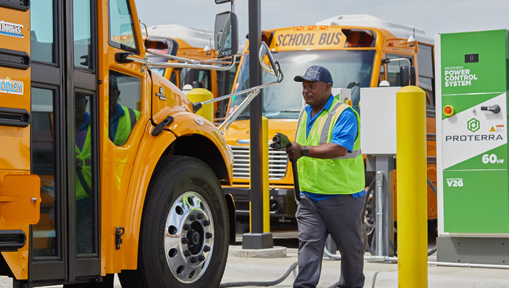ELECTRIFY YOUR FLEET
The 2023 Clean School Bus Program is now OPEN! This year, the EPA anticipates awarding approximately $400 million in competitive grant funding under this program. Applications are due August 22nd. All applicants must apply through grants.gov and must be registered on grants.gov as well as sam.gov.
Download our 2023 electric school buses CSB Grant Fact Sheet below.
Download
Click a question to view answers.
What kind of electric infrastructure will be needed to charge the bus(es)?
- This will be dependent on route demands and depot configuration. To have higher powered DC fast chargers, your site will have to have 480V 3 phase power as well as enough panel space. If there is not enough panel space, the installation of a smaller panel would be necessary. Or if there is not enough power, a service upgrade might be necessary. In most cases, if there is a fleet wide transition to electric, there could be the need for a service upgrade and new transformer.
- There is an option for 240V Single Phase power for a lower-level DC Fast charger. So in some cases, there isn’t a service upgrade that is needed.
What is the estimated cost of installing and maintaining the infrastructure?
- Again, this depends on type of chargers and infrastructure. For example, an all-inclusive project including the chargers and installation with 24kW chargers (this would include pedestals, pouring the concrete, bumper posts, running conduit etc..) for a 4 bus deployment would be roughly $125,000 – $150,000. If you were to put larger more powerful chargers, per say 120kW units, that price would be closer to $200,000 – $225,000. Provided that you have the power and panel capacity.
- There are ways to bring this cost down such as wall mounting the chargers or putting them as close to your electrical panel as possible to mitigate the need for trenching and extra work.
- Subsidies include.
- $13,000-$20,000 per bus from the Clean School Bus Program. (13k if you are non-prioritized and 20k if you are.)
- DTE E-Fleets Program – They offer rebates from $12,000-$70,000 for DC fast charging stations depending on what charger you chose off their list.
What is the gross cost (actual cost with no subsidies added) of a 77 – 84 passenger electric bus? What is the net cost to the district? Please identify all subsidies and their originating sources.
- The gross cost of an electric school bus is anywhere from $375,000 – $420,000. This depends on warranty extensions, air conditioning, and many different options that can be added to your electric school bus. I would say the majority of electric school buses are selling for $375,000-$385,000.
- Subsidies include – Clean School Bus Program which gives $250,000 for NON PRIORITIZED districts and $375,000 for PRIORITIZED districts. This could change with the new Clean School Bus Programs coming out but that is what it was in the 2022 program.
Have the vehicles been tested on dirt roads? How do they perform on dirt roads?
- The structural integrity of the electric school bus is no different than it’s diesel counterpart. The battery is rigorously tested for durability and performance through various amounts of tests including – Water submerging, extreme cold and hot temperatures, weight drop tests (this is where they take the weight of a fully loaded bus and drop it on the battery), shaker table test and more. We do not know of any specific testing that has been done on non-paved roads.
What is the operating life of the bus?
- The life cycle of this bus in Michigan would be the same as an ICE powered bus.
What is the operating life of the battery? How much does it cost to replace the battery? (actual cost. No subsidies)
- The battery is warrantied for 8 years/100,000 miles, and can be extended out to 12 years. The cost to replace the entire battery pack would be roughly $110k.
What specialized training will our Mechanics need to maintain these vehicles?
- Currently, High Voltage training classes available to operator technicians – HV1 and HV2. There is HV3 training which is currently only for dealer personnel but will be released to customers soon. We do also offer preventative maintenance programs.
What exposure to the battery contents do our kids riding the electric bus have if they are involved in a serious accident?
- The structural integrity of an electric school bus is the same as the ones running across the country. Consider the battery to be the engine, there are emergencies that emerge with engine related issues and the same goes for a battery. Proterra is the battery in a Thomas Built Bus and is the industry leader in battery manufacturing and battery safety. They have been running for over 30,000,000 miles on transit buses which is the same battery technology used in our electric school bus.
Knowing that we will be transporting kids, why should we move towards the use of these vehicles now verses waiting 5 years after others have resolved the new operating challenges?
- The Clean School Bus Program – This funding will only last until 2026, and the future is uncertain when it comes to funding. As you know there are many factors into the appropriation of funds from the federal government and we don’t know what that will look like past 2026. What we do know is there is a 5-billion-dollar program available exclusively to schools, which does not come around often.
What does your research show on the battery charging and life performance in cold weather states?
- Our data shows a significant decrease in range on the coldest of days, which can drop the range to about 75-80 miles. This is why route assessments are important and being conservative on what routes these vehicles go on is vital.
What are the operational challenges of charging stations in the cold weather?
- Charging stations are rated to function is temperatures up to -35 degrees F.
What is the operational temperature range of the charger? Bus?
- The batteries in the bus like to be at a temperature of 65-70 degrees F. The chargers don’t necessarily have an “optimal” temperature, but just like with anything else the more tempered weather the better.
How long will it take to charge a 77-passenger bus in -10 degree weather? How long will the battery charge hold at 100% charged in the cold weather?
- This depends on the size of the charger, but with a 60kW charger, the bus will charge 0-100% in about 3-4 Hours.
Partner with Hoekstra
We can help you from start to finish and well beyond!
- Provides Electric School Bus
- Long & Short Term Support
- Grant Writing
- Driver Training
- Technician Training
- Charger & Operation Training
- Provide Charger Appropriate Information
- Structure & Installation
Begin Your Electric Journey
We’re here when you’re ready to add electric vehicles to your fleet! Partner with Hoekstra Transportation for a consultative approach to purchasing your new electric vehicle. We’ll guide you through the most frequently asked questions, customization options, as well as leasing and fleet solutions to help you make the most informed choice.
Recent News

NOW OPEN!! The Michigan Department of Education (MDE), in collaboration with the Michigan Department of Environment, Great Lakes, and Energy (EGLE) and the Michigan Association of Pupil Transportation (MAPT), has…

Governor Whitmer Proposal Governor Whitmer’s proposal will help more families go electric, knocking $10,000 off the price with the $7,500 federal credit, a $2,000 rebate for a new electric vehicle…

Winter brings its own set of challenges, especially for those responsible for the safety of young passengers on school buses. As snow blankets the roads, ensuring a safe journey becomes…



 HOEKSTRA FAMILY OF COMPANIES
HOEKSTRA FAMILY OF COMPANIES

